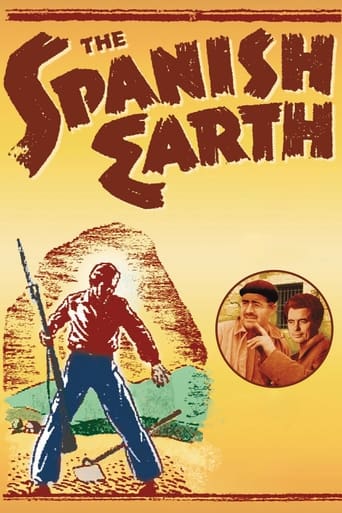MARIO GAUCI
This famous "on the fly" barely-feature-length documentary about the Spanish Civil War was endorsed by the likes of writers Ernest Hemingway (who provides the dry narration), John Dos Passos, Lilian Hellman and actor Orson Welles (whose name also appears on the poster but whose vocal contributions were eventually dropped). Starting out with the images of farmers 'testing' for water sources on their lands, it soon settles down to denoting how the conflict was affecting a besieged Madrid: from the breadlines offering insufficient stamped supplies to the clandestine Loyalist meetings to the destruction left in the wake of the Fascist (read Nazis and Italians) aerial bombings.Although the Spanish Civil War would be the subject of several Hollywood movies – most prestigiously via Hemingway's own epic FOR WHOM THE BELL TOLLS (1943) – and cast an indelible shadow over the careers of future native film-makers (especially Carlos Saura), we know precious little about the conflict itself and, tellingly, we do not learn much here either; indeed, Ivens is merely content to observe – panicking villagers mourning their dead and loss of property – and report – we are told that the bearded Loyalist officer seen here organizing and inspecting his troops will die in the next assault! Perhaps the most striking moment occurs when a bike-riding mailman enters a building and has to literally skip over the corpses of victims still blocking the foyer entrance! Interestingly, the U.S. funded production was selected by the "National Board of Review" as one of the year's Top 10 foreign films!
davidleequinn1950
During the time this documentary was made, Hollywood was rife with Communists. For some reason there were scores of Hollywood types who thought that Socialism was the way to go despite all evidence to the contrary. The production company that made this documentary was made up of a whos-who of Communist sympathizers, Jos Dos Passos, Lillian Hellman, etc. As a result this documentary is completely slanted to one side, the side of the Republicans, which were supplied and supported by the Soviet Union. There is absolutely no attempt to be even handed in the presentation, Republicans=Good, Nationalists-Bad. If you decide to view this documentary go into it with the forewarning that none of what you are seeing is in any way even handed.
Emil Bakkum
I find this documentary film about the Spanish Civil War deeply moving. There are several causes. One is the narrative, which is done by Ernest Hemingway, a personality who for some reason has always appealed strongly to my imagination. And then there is the war itself, which is legendary especially among people with progressive inclinations. It was there and then, that a democratically elected government and a peoples army tried to resist the fascist troops of Franco. The civil war soon obtained international dimensions, when the Italian and German fascists started to support Franco. The peoples army, on the other hand, was reinforced by tens of thousands of international volunteers, united in international brigades. Ernest Hemingway was among these, as well as Joris Ivens. The film narrates of illustrious battle scenes, such as the defense of Madrid, in particular the heroic fight for the Argand bridge over the Jarama river. Just the name awakens in memory the sound of the pertinent Ernst Busch songs, another veteran of the Civil War, giving shivers along the spine. In addition, the time was politically interesting, since for the first time anarchist cooperation methods seemed to work out in a fruitful way. The film succeeds brilliantly in catching the contemporary spirit of hope and heroism. A large part is devoted to realistic (albeit probably partially enacted) battle scenes, where the republican army digs in against the fascist attacks. There is however also plenty of room for rural scenes, of village life at and just behind the front. It was vital to maintain the food supply to the beleaguered city of Madrid. And life in Madrid itself is shown, with the bombardments by the air force of Franco. We also witness the speeches and debates in the Spanish parliament. Of course the film is not neutral or an objective account. The story is clearly romanticized and sometimes dramatized, for instance when we see the farmers son writing letters home, or returning on leave to his family. And although I am not an expert, the democratically elected government actually seems to have been far from ideal. There were many abuses, and the intervention of the communist brigades does not help in increasing its good reputation. Nevertheless, it is still obvious who are the good guys, and who are the crooks. The film contains plenty of movement and action, and it ably addresses our feelings of sympathy. It are films such as Misere au Borinage and this one, which imho makes Joris Ivens a greater film maker than Eisenstein. If you fancy war films or the Spanish Civil War, this film is definitely a must-have.
Jim Tritten
Probably more shocking at the time, this dated essay on war documents the good peasants and peoples army vs. the bad professional army and foreign troops. One of the earlier times that a camera was permitted to document the horrors of war, the production attempts to tell the moral message of the righteousness of the Republican cause -- but ultimately the film denounces war itself. Despite its noble crew, the documentary is slow-moving and suffers from what appears to be a voice-over of a silent film. A must see for those who have to see something about the Spanish Civil War or who have to hear Hemingway's voice, but this is not an evening's entertainment. The Why We Fight series done by the US Army during World War II is far superior. The horrors of war were captured for the present generation on their TV screens during the Viet Nam War.


